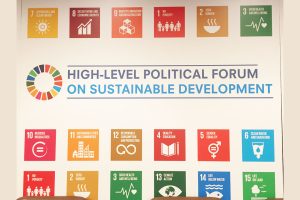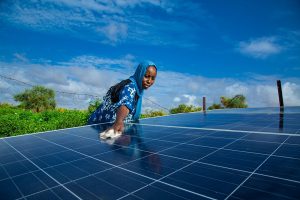The African Union Commission (AUC), the UN Economic Commission for Africa (ECA), the African Development Bank (AfDB), and the UN Development Programme (UNDP) issued a report assessing Africa’s progress towards the SDGs and related goals of Agenda 2063 in light of the COVID-19 pandemic and the war in Ukraine. The report finds that without “an SDG push,” by 2030, at least 492 million people will be left in extreme poverty, and at least 350 million by 2050.
The 2022 Africa Sustainable Development Report is aligned with the 2022 High-level Political Forum on Sustainable Development (HLPF), which focused on the theme, ‘Building back better from the Coronavirus disease while advancing the full implementation of the 2030 Agenda for Sustainable Development,’ and conducted in-depth review of SDGs 4 (quality education), 5 (gender equality), 14 (life below water), 15 (life on land), and 17 (partnerships for the Goals).
The report finds that Africa’s progress on achieving universal education has been slow. It flags that despite considerable improvements in school enrolment, 288 million school-age children remain out of school, especially in countries affected by conflict. The report calls for increased funding for education infrastructure, especially at the preschool and primary school levels, and for investment in the training of teachers and digital connectivity.
Progress on SDG 5 has likewise been slow, with the enforcement of legal frameworks to protect women and girls against discrimination, domestic violence, child marriage, and female genital mutilation (FGM) remaining weak across the continent. For example, FGM in Africa excluding North Africa declined modestly from 29.4% in 2015 to 24.7% in 2021, and from 83% in 2015 to 74% in 2021 in North Africa.
“Organic and chemical pollutants from human activities continue to endanger Africa’s marine ecosystem,” the report warns. It calls for enhanced institutional capacity to enforce laws and regulations for the sustainable use of marine resources, and recommends raising awareness of waste management and infrastructure development in coastal areas to curb pollution.
Due to the conversion of forest land for farming and grazing, and climate change, loss of forest cover, biodiversity, and land degradation remains high and widespread, the report finds. Land degradation affects 46% of Africa’s land and 65% of the population, and costs the region USD 9.3 billion every year. Significant efforts are needed to implement policy frameworks to foster the sustainable management of forests, biodiversity, and land, along with public-private partnerships (PPPs) to mobilize and channel funding towards a green and resilient recovery, according to the report.
Only slight improvement has been registered on SDG 17. Noting decreases in Official Development Assistance (ODA) and Foreign Direct Investment (FDI) inflows, the report recommends that Africa foster its domestic resource mobilization and savings and boost its information and communication technology (ICT), to accelerate implementation of the SDGs and Agenda 2063.
The report assesses the impacts of the COVID-19 pandemic on selected SDG indicators under four scenarios: no COVID; a COVID baseline; a High Damage scenario; and an SDG Push scenario. As an illustration, the pandemic pushed 23.6 million Africans into extreme poverty in 2021, compared to the no-COVID scenario. The report estimates that by 2030, at least 492 million people will remain in extreme poverty, and at least 350 million people by 2050. However, if countries adopt and implement policies to “push” the SDGs, the number of people in extreme poverty would drop from 489 million in 2021 to 442.4 million in 2030, and to 159.7 million in 2050.
The report further describes how the impacts of the war in Ukraine are threatening food security and economic stability in Africa, triggering social unrest in some countries. It recommends that the region, inter alia: build resilient economic systems to reduce the over-reliance on food imports by transforming agricultural productivity through modernization; and make significant investments to promote equitable and affordable access to energy to sustain economic transformation.
The report was launched on 15 December 2022, during the African Economic Conference 2022 in Balaclava, Mauritius, and made publicly available on 10 January 2023. [Publication: 2022 Africa Sustainable Development Report] [Publication Landing Page] [AfDB Press Release]


